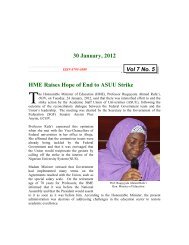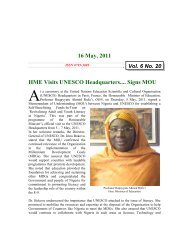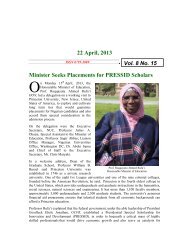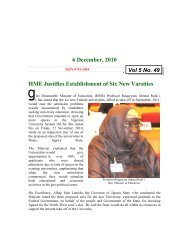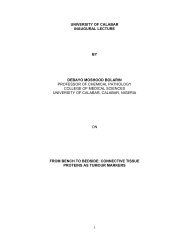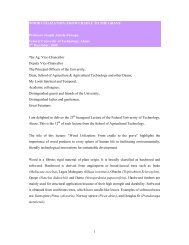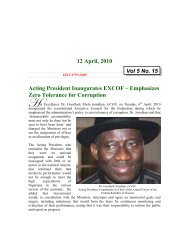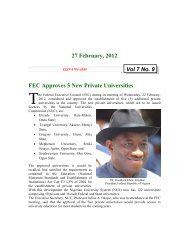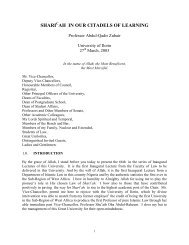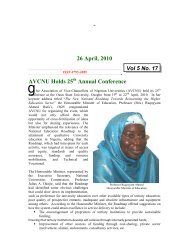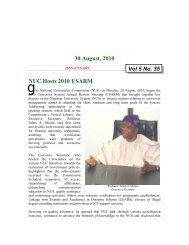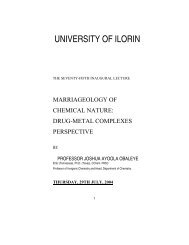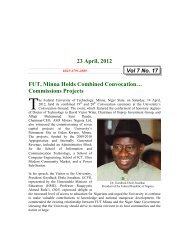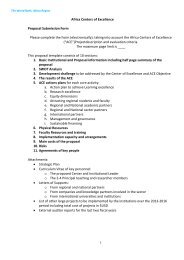From State And State Power To Man And Social - National ...
From State And State Power To Man And Social - National ...
From State And State Power To Man And Social - National ...
You also want an ePaper? Increase the reach of your titles
YUMPU automatically turns print PDFs into web optimized ePapers that Google loves.
middlemen and pauperized middle class. Not surprisingly, Nigeria was most inconsistent andambivalent in the practice of the diplomacy of the new international economic order. For, unlikethe diplomacy of both DISI and REI, that of NIEO was directed towards altering the oldinternational division of labour between the industrialized and the non-industrialized countries.Fourth, the so-called ‘new’ economic diplomacy of the regime of Babangida, that is thediplomacy of Structural Adjustment Programme, had certain specific distinctive features. In thatperiod, attraction of foreign capital and debt rescheduling became a pre-eminent goal ofNigeria’s foreign policy. Diplomatic achievements came to be measured, according to IkeNwachuku, Nigeria’s Foreign Minister between 1988 and 1992, “more or less by the number ofinvestors who visit[ed]” Nigeria from the different countries to which Nigeria accredited envoys.or “by the tonnage of Nigeria’s produce and articles sold as a result [through the efforts of theenvoys]”. Another feature of the ‘new’ economic diplomacy was a new cost-consciousness inNigeria’s diplomacy; in foreign aid to other developing countries, for instance, emphasis shiftedfrom financial assistance to technical assistance. A far more important feature of the newdiplomacy was the use of innovative diplomatic strategies: the manipulation of domesticopposition to obtain certain outcomes in a negotiation and to narrow the options open to anegotiating opponent; trying to shape the structure of the bargaining situation by identifying andmobilizing allies in the developed countries in negotiations with them; seeking new sources offoreign capital by cultivating the sympathy and support of Africans in the Diaspora.Fifth, fundamentally, the so-called ‘new’ economic diplomacy was not new; it was virtually areturn to the old diplomacy of the period, 1960-1965. More important, it did not serve Nigeria’snational interest, however defined. The use of foreign policy and diplomacy to attain theobjectives of SAP entailed the promotion of export trade especially on non-oil commodities; themaximization of the inflow of direct foreign investment; and the enhancement of the inflow ofexternal public loans. None of these objectives was significantly attained. In respect of exporttrade, the Annual Report of the Central Bank of Nigeria (CBN), for the year 1989, presented apicture of poor performance of the non-oil export sector. It stated categorically that the “share ofnon-oil exports as a percentage of total exports declined from 8.8% during the period underreview [i.e.1986-1989], as a result of the decline in cocoa beans exports”. Concerning the inflowof direct foreign investment, the picture was only slightly better. According to the Annual Reportof the CBN, “direct investment” in Nigeria declined from $613.2 million in 1967 to $381.8million in 1988, but rose sharply to $1,898.6 million in 1989 [CBN Annual Report, 1989:105].However, as the report itself clearly explained, this investment was not strictly new foreigninvestment. In respect to the apparently phenomenal increase in 1989, for instance, the Reportcommented as follows:This was accounted for mainly by the purchase of Federal Governmentshares in Shell Petroleum Development Company Nigeria Limited by three oilcompanies, namely, Shell, ELF, and AGIP. Other sources of foreign investmentinflow were re-invested earnings of oil companies…and proceeds from debtconversion [which] were responsible for the increase in the cumulative directforeign investmentAdmittedly, with respect to debt conversion, the ‘new’ economic diplomacy had something to dowith it; but this could hardly be said of the other factors. Increase in public sector net claims onforeigners arising from the sale of Federal Government equities in Nigerian oil companies to21



